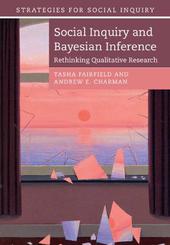
|
Social Inquiry and Bayesian Inference: Rethinking Qualitative Research
Hardback
Main Details
| Title |
Social Inquiry and Bayesian Inference: Rethinking Qualitative Research
|
| Authors and Contributors |
By (author) Tasha Fairfield
|
|
By (author) Andrew E. Charman
|
| Series | Strategies for Social Inquiry |
|---|
| Physical Properties |
| Format:Hardback | | Pages:300 | | Dimensions(mm): Height 250,Width 173 |
|
| ISBN/Barcode |
9781108421645
|
| Classifications | Dewey:300.727 |
|---|
| Audience | | Tertiary Education (US: College) | |
|---|
| Illustrations |
Worked examples or Exercises; Worked examples or Exercises
|
|
Publishing Details |
| Publisher |
Cambridge University Press
|
| Imprint |
Cambridge University Press
|
| Publication Date |
4 August 2022 |
| Publication Country |
United Kingdom
|
Description
Fairfield and Charman provide a modern, rigorous and intuitive methodology for case-study research to help social scientists and analysts make better inferences from qualitative evidence. The book develops concrete guidelines for conducting inference to best explanation given incomplete information; no previous exposure to Bayesian analysis or specialized mathematical skills are needed. Topics covered include constructing rival hypotheses that are neither too simple nor overly complex, assessing the inferential weight of evidence, counteracting cognitive biases, selecting cases, and iterating between theory development, data collection, and analysis. Extensive worked examples apply Bayesian guidelines, showcasing both exemplars of intuitive Bayesian reasoning and departures from Bayesian principles in published case studies drawn from process-tracing, comparative, and multimethod research. Beyond improving inference and analytic transparency, an overarching goal of this book is to revalue qualitative research and place it on more equal footing with respect to quantitative and experimental traditions by illustrating that Bayesianism provides a universally applicable inferential framework.
Author Biography
Tasha Fairfield is an Associate Professor at the London School of Economics, with a Ph.D in political science from the University of California, Berkeley, and an M.S. in physics from Stanford University. Her publications include Private Wealth and Public Revenue in Latin America (Cambridge, 2015), which won the Donna Lee Van Cott Book Award. Andrew E. Charman is a Lecturer and Researcher in Physics at the University of California, Berkeley, and an expert in Bayesian statistics. Beyond analyzing measurements of antimatter and the foundations of quantum mechanics, he has explored methods for optimal congressional apportionment and statistical mechanical models of gerrymandering. His previous work with Tasha Fairfield received APSA's QMMR Sage Paper Award.
Reviews'Social Inquiry and Bayesian Inference outlines the philosophy, logic, and mathematics of Bayesian process tracing more thoroughly than any other source to date, and it translates them into practical advice that qualitative researchers can carry out even if they don't want to wade through the details of the math. This will be the seminal statement on Bayesian process tracing for many years to come. It should be on the syllabus of everyone teaching case study methods and the bookshelf of everyone using these methods in their own research.' Andrew Bennett, Professor of International Relations, Georgetown University 'Fairfield and Charman have written a major book that will resonate across the social sciences. They manage to combine astute technical discussion of the Bayesian approach with a 'how to' that will assist researchers regardless of approach or prior experience with these tools.' Stephan Haggard, Lawrence and Sallye Krause Distinguished Professor, School of Global Policy and Strategy, University of California San Diego 'In this book, Fairfield and Charman develop the most systematic and concrete approach to qualitative research in political science. The Bayesian framework provides a clear structure for learning from evidence within and across cases, and the book provides clear and actionable guidelines that scholars can take on board. Readers will learn a great deal from this book about designing and carrying out rigorous and transparent qualitative research.' Hillel David Soifer, Associate Professor, Department of Political Science, Temple University 'This book sets out a powerful set of tools for undertaking systematic and analytically explicit qualitative inference. Fairfield and Charman provide a clear and accessible introduction to Bayesian principles and show how they can be applied to the kinds of questions and data with which qualitative social scientists routinely grapple. This volume represents an important step forward for the development and teaching of qualitative methods.' Alan Jacobs, Professor of Political Science, University of British Columbia
|